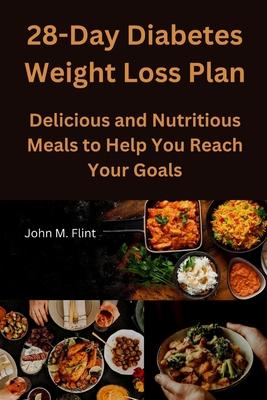- Here are some general guidelines for a 28-day diabetic diet plan for weight loss:
- Eat a variety of colorful fruits and vegetables: Aim for at least 5 servings of fruits and vegetables per day. Choose a variety of colors to ensure you're getting a wide range of nutrients.
- Choose whole grains: Opt for whole grain breads, cereals, and pasta instead of refined grains. Whole grains are high in fiber and can help keep blood sugar levels stable.
- Include lean protein sources: Choose sources of protein such as chicken, fish, tofu, beans, and nuts. These may keep you feeling satisfied and full.
- Limit added sugars: Try to minimize added sugars in your diet, as these can cause blood sugar spikes and contribute to weight gain.
- Incorporate healthy fats: Include healthy fats such as avocado, olive oil, and nuts in your diet. These can help you feel full and satisfied, and can also help regulate blood sugar levels.
- Eat regular, balanced meals: Aim to eat 3-4 balanced meals per day, spaced out evenly. This can help keep your blood sugar levels stable and prevent spikes and dips.
- Stay hydrated: Drink plenty of water and other unsweetened beverages to help keep your body hydrated and support weight loss.
- It's important to note that every person's needs are different, and it's important to work with a healthcare professional or registered dietitian to develop a personalized plan that meets your individual needs and goals.

Book
28-Day Diabetes Weight Loss Plan: Delicious and Nutritious Meals to Help You Reach Your Goals
(Write a Review)
Paperback
$9.99
- Here are some general guidelines for a 28-day diabetic diet plan for weight loss:
- Eat a variety of colorful fruits and vegetables: Aim for at least 5 servings of fruits and vegetables per day. Choose a variety of colors to ensure you're getting a wide range of nutrients.
- Choose whole grains: Opt for whole grain breads, cereals, and pasta instead of refined grains. Whole grains are high in fiber and can help keep blood sugar levels stable.
- Include lean protein sources: Choose sources of protein such as chicken, fish, tofu, beans, and nuts. These may keep you feeling satisfied and full.
- Limit added sugars: Try to minimize added sugars in your diet, as these can cause blood sugar spikes and contribute to weight gain.
- Incorporate healthy fats: Include healthy fats such as avocado, olive oil, and nuts in your diet. These can help you feel full and satisfied, and can also help regulate blood sugar levels.
- Eat regular, balanced meals: Aim to eat 3-4 balanced meals per day, spaced out evenly. This can help keep your blood sugar levels stable and prevent spikes and dips.
- Stay hydrated: Drink plenty of water and other unsweetened beverages to help keep your body hydrated and support weight loss.
- It's important to note that every person's needs are different, and it's important to work with a healthcare professional or registered dietitian to develop a personalized plan that meets your individual needs and goals.
Paperback
$9.99